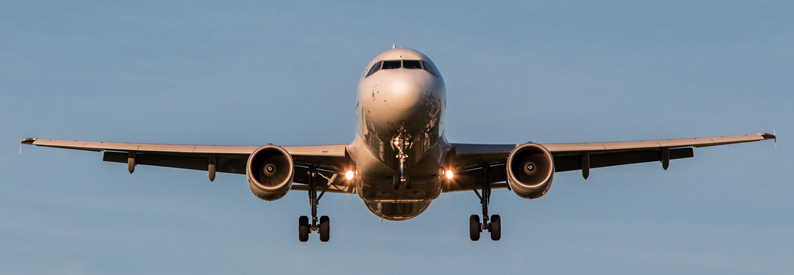IOM-based SPV takes Air Zimbabwe to court over A320s
An Isle of Man-based special purpose vehicle (SPV) has taken Air Zimbabwe (UM, Harare Int'l) to court in Zimbabwe over its failure to pay leasing dues on two A320-200s amid a dispute over who owns the jets.
Z-WPM (msn 630) and Z-WPN (msn 1973) were part of a 2012 deal between China Sonangol International (Hong Kong Int'l) and the then Mugabe regime to help revive the debt-ridden state-owned airline. The deal was structured via a pair of IOM-based SPVs, SouthJet Two and SouthJet One. However, only one of the aircraft ever entered sustained operations - Z-WPN - while the other - Z-WPM - has languished at Johannesburg O.R. Tambo since January 2014 given a lack of funds needed to effect major repairs to its airframe and landing gear.
During a May 2016 address to parliament, then Minister of Transport Joram Gumbo explicitly stated that the aircraft had been dry-leased from the Chinese petroleum firm.
"The aircrafts[sic] were not purchased, but are being leased from China Sonangol since 2012," he said at the time. "These were part of efforts by Government to support the turnaround process of Air Zimbabwe."
However, according to Zimbabwean court documents seen by the privately-owned Zimbabwe Independent newspaper, the Zimbabwean state now claims that the two A320s were "donated" to it in 2013, a claim SouthJet has explicitly rejected.
The IOM SPV's Zimbabwean legal representative, Sawyer and Mkushi founding partner Honour Mkushi, told the paper that Air Zimbabwe had no rightful claim to the aircraft given they are still registered in his client's name.
"I represent SouthJet One, they are my clients. The two aircraft belong to SouthJet and they are not operating at the moment because there are a lot of arrears to be paid in respect of the rentals. So, in a nutshell, the aircraft belong to them. If the airplanes were theirs, how could they fail to service them?" he said.
SouthJet's stance is further reinforced by comments Joram Gumbo made later in his May 2016 parliamentary speech. At the time, the Airbus deal had generated much controversy amid claims it was a precondition for China Sonangol, a firm linked to controversial Chinese businessman Sam Pa, to gain access to a Zimbabwean diamond mining concession. In his address, Gumbo conceded that even then, Air Zimbabwe was in arrears to SouthJet.
"They [the aircraft] were not bought by diamonds money. I am 100% certain. I have got the contract and the person you are talking about, Sam Pa, did the negotiations but only on behalf of Sonangol," Gumbo said. "They are actually pestering us for the payment and I have the overdue account of the repayments that we have not been able to meet. This is why my response to Hon. [William] Mutomba was that it is either we can pull in or pull out because I know we owe the company the money payable at USD200,000 a month. So, clear your mind and believe me because I am saying the truth as it is."
Air Zimbabwe assistant administrator Tonderai Mukubvu has since acknowledged the impasse but challenged SouthJet to prove its claim.
"It is work in progress and it is not yet resolved. They (SouthJet One) are trying to prove their claim because when someone says they own something they have to prove the basis on which they are making their claim on," he told The Independent.
Given a lack of official paperwork proving the lease had indeed transmogrified into a donation as claimed, an Air Zimbabwe source told The Independent that the airline had been unable to complete maintenance to either of the A320s.
"The Airbuses were a donation which was made to the Government of Zimbabwe which then gave the planes to Air Zimbabwe. But what we have to sort out are the donation papers so that we are able to use them. They are due for tests and we cannot service them because we need access to the software and computer platform," the official said.
Loss of the aircraft and the imposition of a hefty backdated lease account would add to Air Zimbabwe's already mountainous debt pile, said to exceed USD350 million, and damage an already soiled image. As the sole owner of Air Zimbabwe, the Zimbabwean government has been looking for foreign investors to assist in the airline's relaunch, a proposal that has yet to be taken up. Aside from its debts, prospective investors are also wary about the extent of the rot within the airline.
In her 2019 report to parliament presented in June, Auditor General Mildred Chiri said that in light of a breakdown in internal controls in the 2009, 2010, 2011, 2012 and 2013 financial years, she had had to issue a disclaimer opinion for Air Zimbabwe's 2011 through 2014 financial years. In addition, for the 2018 financial year, she again noted gaping holes in the airline's accounts as well as evidence of poor corporate governance. The report did not specify whether this had occurred before or after Air Zimbabwe was placed under independent administration in October 2018.
"Accountability issues continued to affect Air Zimbabwe (Private) Limited," the report said. "The Company could not provide supporting documentation for operating expenses amounting to USD13,705,014 and petty cash expenditure amounting to USD654,587. The Airline also had an unexplained suspense balance of USD27,965,576. The company has not accounted for all aircraft[sic]. There were unsupported payables balances of at least USD26 million and unexplained variances of USD87 million from amounts confirmed by suppliers. No minutes of board and management meetings were available for the period under review. Cash withdrawals amounting to USD173,162 could not be traced to the books of accounts."
Notwithstanding the SouthJet suit, Chiri also highlighted that a number of court cases in which Air Zimbabwe was involved, had not been quantified and adequately disclosed due to the unavailability of lawyers’ confirmations.
Neither Air Zimbabwe nor the Zimbabwean government was immediately available for comment.


No comments:
Post a Comment